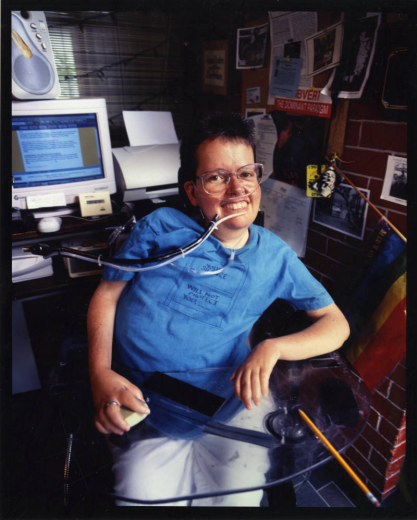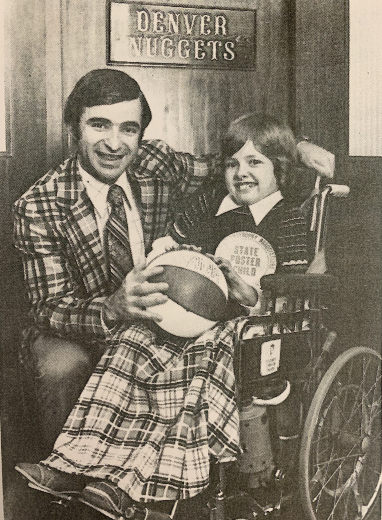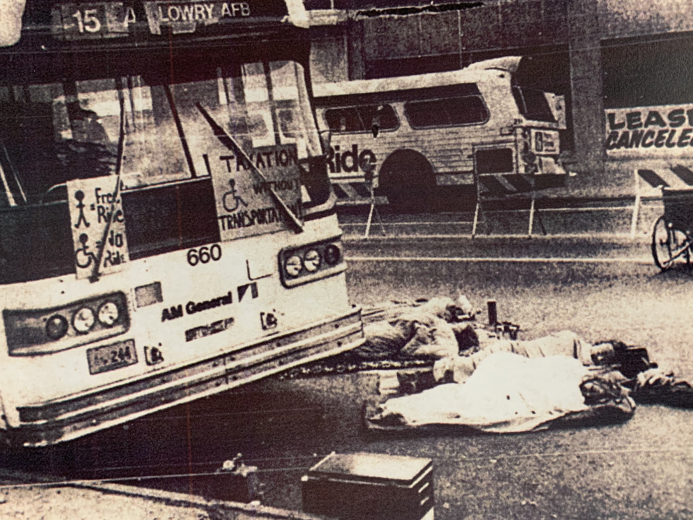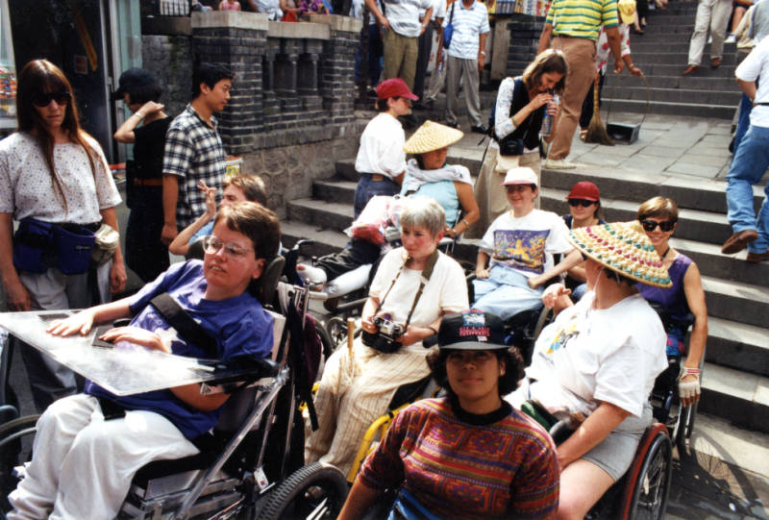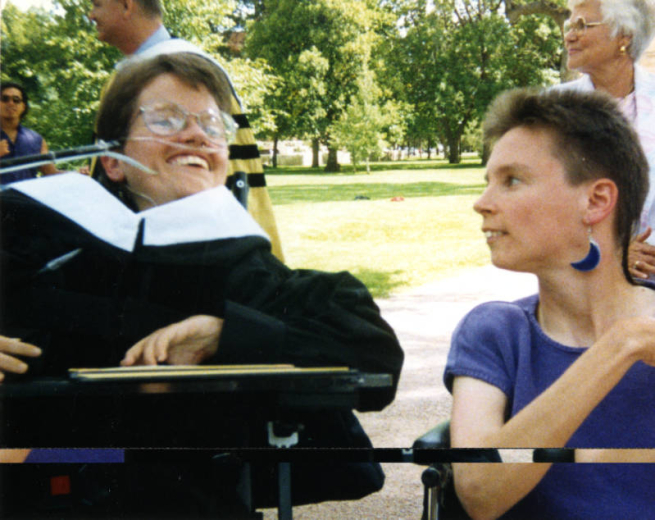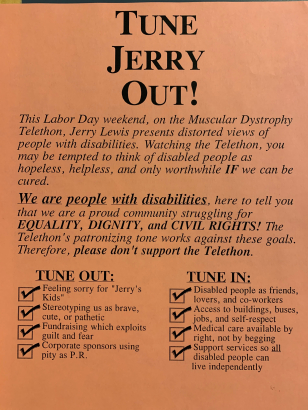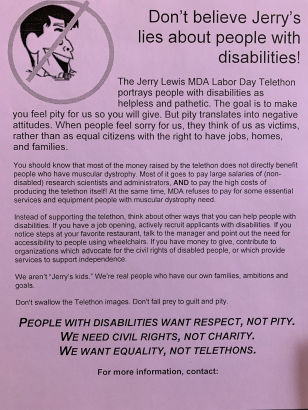Laura Hershey was a prolific author, poet and activist. She also fought for civil rights of people with disabilities and the gay community.
Laura Hershey was born in Littleton, Colorado, on August 11, 1962. Her parents were Richard and Faye and she had a younger brother named John. As a toddler, she was diagnosed with Spinal Muscular Atrophy (SMA). The disease prevents a person from being able to tell their muscles what to do. This causes the muscles to become weaker over time. Many children even die from being unable to eat and breathe as a result.She used a wheelchair from a very young age. In those days, it was expected that children with disabilities would not accomplish much.
At this same time, Jerry Lewis, a well-known actor, ran an annual television show meant to raise money for Muscular Dystrophy (a disease related to SMA). These telethons would often show children in wheelchairs on television in order to get people to donate. At the age of 11, the telethon recruited Laura to be their poster child for Colorado. In Laura’s words, “I was enlisted into this role of cheerful victim.” She came to resent the fact that society saw her as someone to be pitied rather than someone who could be empowered as a full citizen in society. Luckily, Laura’s mother understood her potential and saw education as the best way to build personal strength.
Laura showed herself to be an excellent and active student. In high school, she was a member of the debate team and a writer for the school newspaper. She developed a passion for history once she was at Colorado College and graduated with honors. Laura also won a Thomas J. Watson Fellowship that enabled her to travel to Britain in the early 1980s. It was there that she began to meet more and more people engaged in disability activism. She saw it as a fight in which she needed to be involved and her skills and education prepared her well for the challenges ahead.
During the 1970s, while Laura was still a child involved in the telethon, things began to slowly change for the better. People like Robert Ruffner, with the President’s Committee on Employment for the Handicapped, started to speak out about the lack of access for people with disabilities. In many places, there was no way for people who used wheelchairs or other tools to even enter buildings. Ruffner and many others were beginning to argue that disabilities should not prevent children like Laura from attending public schools in regular classrooms. They said that they should be able to be independent, go to work and do their own shopping like any other person.
In 1978, Denver became a center for the new movement for civil rights among those with disabilities. People with disabilities paid taxes like everyone else, but those using wheelchairs were unable to use most of the public transportation in Denver. In protest, they organized a barricade around buses at Colfax and Broadway using their own bodies. They prevented buses from moving for 24 hours. A short time later, the Regional Transportation District (RTD) agreed to make all Denver buses wheelchair-accessible. Similar protests began taking place around the country.
In 1985 there was talk of Denver ending some of its wheelchair-accessible bus service and a group of activists called Americans Disabled for Public Access (ADAPT) swung into action. They again put their bodies in front of buses to prevent them from moving. This battle was also won and the movement continued to grow. By 1990, the US Congress had instituted the Americans with Disabilities Act (ADA). It made it illegal to discriminate against people with disabilities in all aspects of public life like schools, workplaces and public transportation.
Laura became very active in groups like ADAPT as the ADA came under constant attack. Her focus was not just on protecting civil rights, but on empowering people whose rights were threatened. She began protesting the very telethon for which she had been a poster child and demanded that people with disabilities be seen as full citizens with rights, rather than people who should be pitied. As a lesbian, she also stood up for the rights of the gay community. Laura became recognized around the world for trying to make people's lives better.
She also focused on her passion for writing. Laura wrote a book to help people with disabilities to travel overseas. Her essays and news articles were published in respected journals and magazines. Her poetry also earned her a great deal of respect. One of her most well-known poems speaks both to young people and adults facing struggles in their lives. It is called, “You Get Proud by Practicing.” You can follow the link to hear the poem read by Laura. The poem ends with,
Remember, you weren’t the one
Who made you ashamed,
But you are the one
Who can make you proud.
Just practice,
Practice until you get proud, and once you are proud,
Keep practicing so you won’t forget.
You get proud
By practicing.
Laura chose to ignore stereotypes and to do what fulfilled her as a person. She fought for the rights of herself and others and wrote to help others see themselves as whole people worthy of love and entitled to their rights. Laura embraced education and spent her life sharing what she learned with others while also continuing to learn from the many people she worked with across the globe. Laura died in 2010, only two years after her and her partner, Robin Stephens, had adopted their daughter Shannon. It was a blow not just to Laura’s family, but also to the countless people whose lives she touched. Yet, her work goes on today in those fighting for equal rights and for the respect for individual lives everywhere.
disability - a condition (such as an illness or an injury) that damages or limits a person's physical or mental abilities
pity - feeling bad for a person in a way that can lead one to look down on them
recruit - to find people to join your group or activity
empowered - to have the strength or energy for something
activism - working to bring about change that you believe will improve the world
stereotypes - often unfair and untrue beliefs that many people have about all people or things with a particular characteristic
What do you think changed Laura's mind about the Jerry Lewis Telethon that she had once been a part of?
What challenges are there in your own life? How do you deal with them in order to become stronger?
Why do you think Laura put so much of her energy into so many different activities?
Laura Hershey Collection of personal papers, protest materials, and writings
Survival strategies for going abroad : a guide for people with disabilities / by Laura Hershey.

